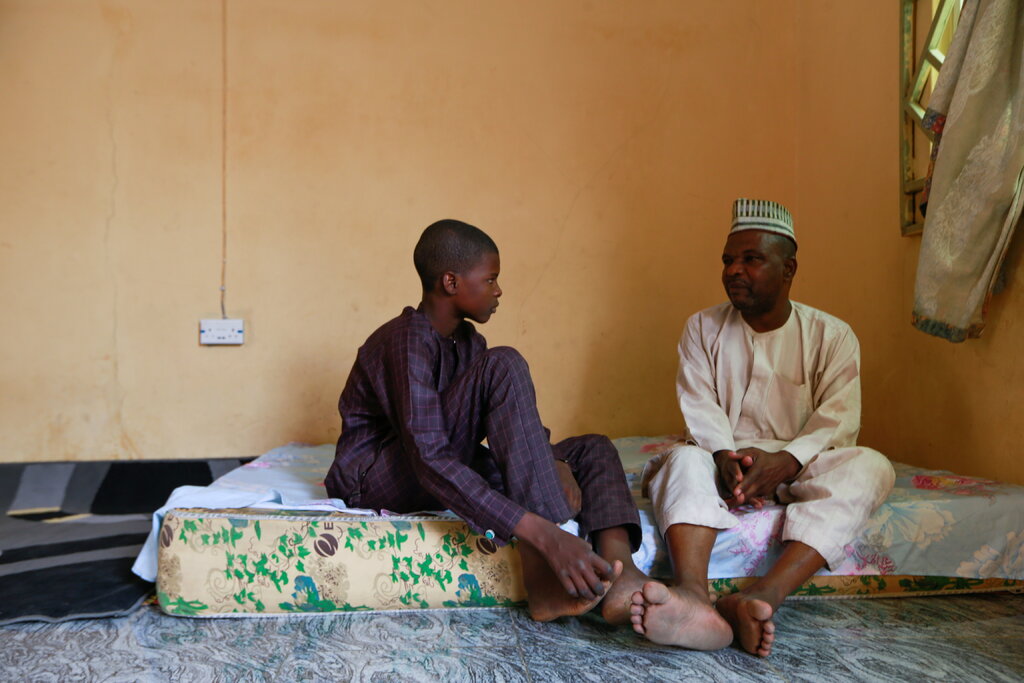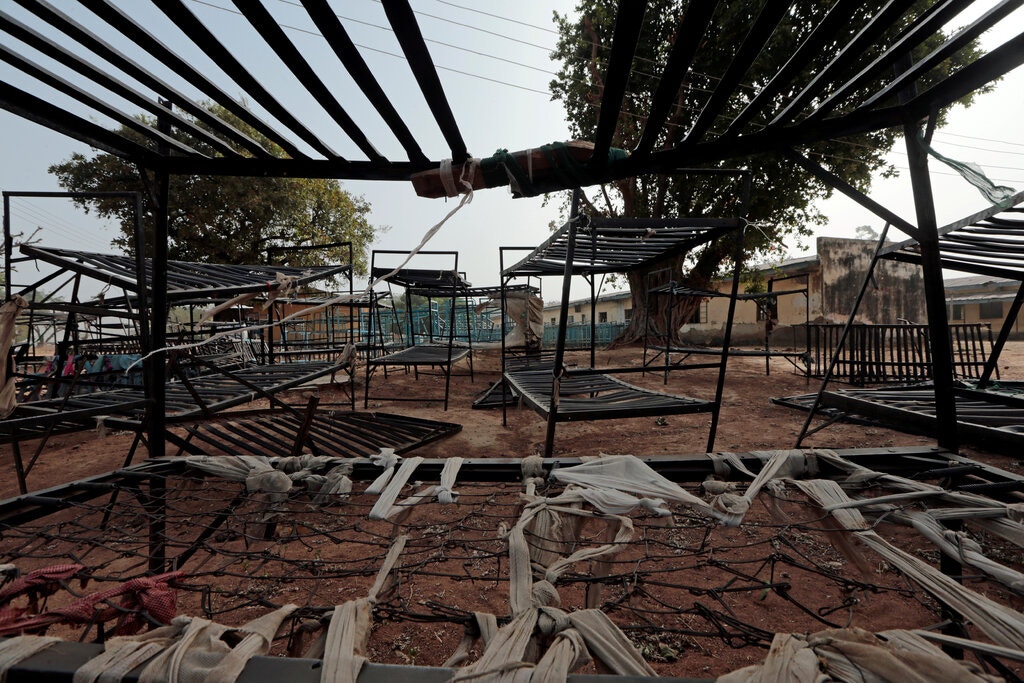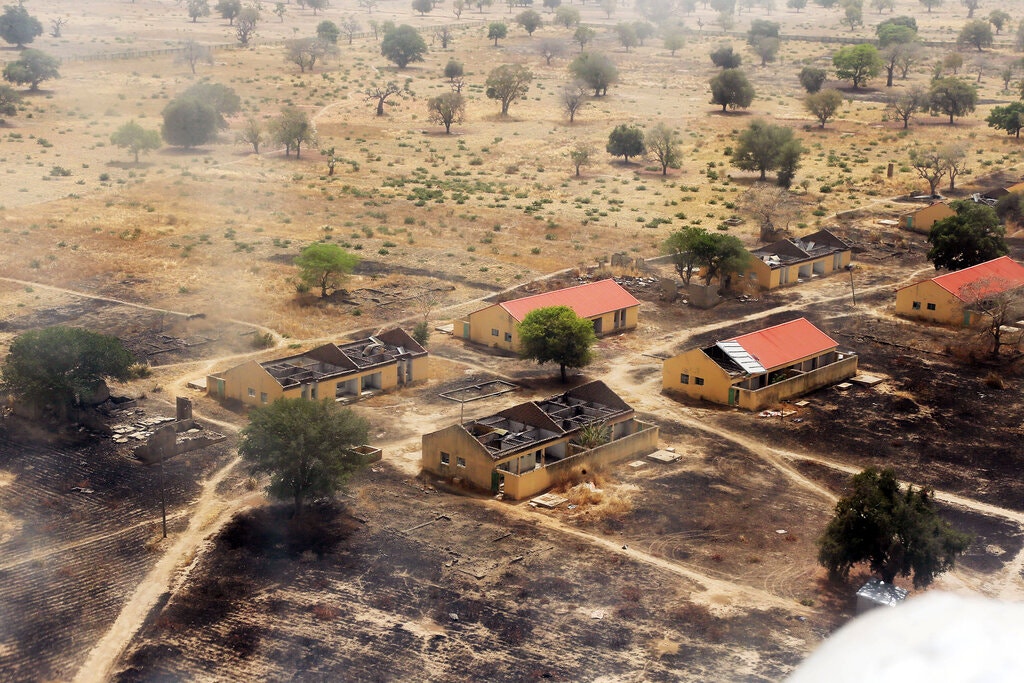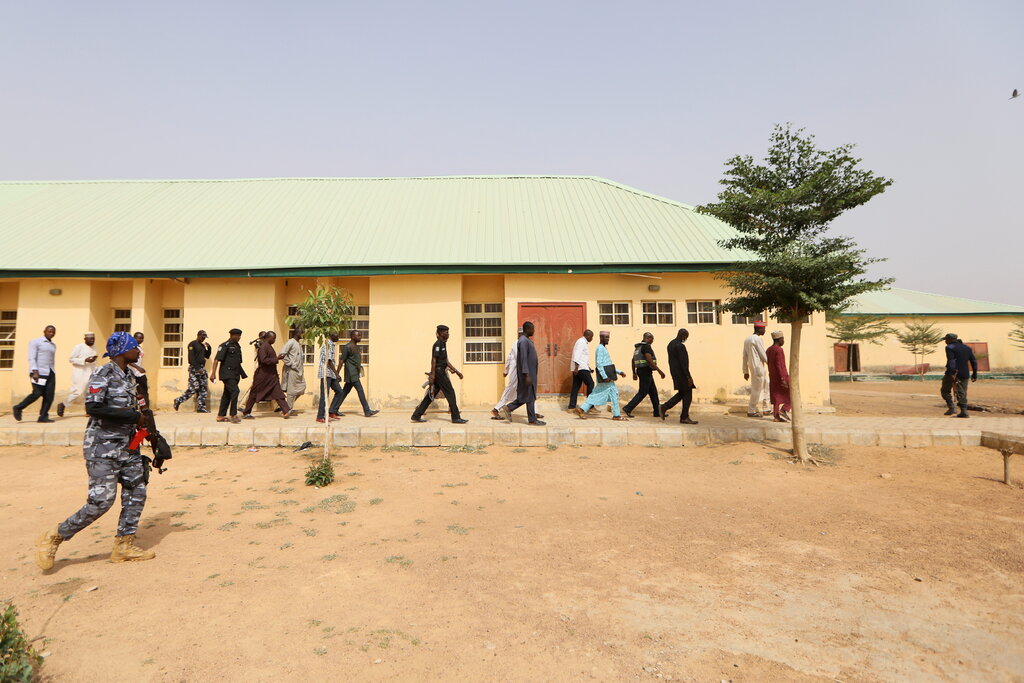
[ad_1]
When nearly 300 Nigerian schoolgirls were kidnapped from their boarding schools by the Islamist group Boko Haram in 2014, the world exploded in outrage.
Hundreds of people marched through the nation’s capital, the hashtag #BringBackOurGirls was picked up by then-first lady Michelle Obama and the Nigerian President scrambled to respond to the mass kidnapping in the village of Chibok.
It seemed like an aberration.
But since last December, mass kidnappings of girls and boys from boarding schools in northwest Nigeria have been occurring with increasing frequency – at least once every three weeks.
Last Friday, more than 300 girls were taken from their school in Zamfara state.
They were released this week, the state governor said on Tuesday.
The previous week, more than 40 children and adults had been abducted from a boarding school in Niger state. They were released on Saturday.
With the Nigerian economy in crisis, kidnappings have become a growth industry, according to interviews with security analysts and a recent report on the kidnapping economics.
The victims are not only the rich, the powerful or the famous, but also the poor – and increasingly, the schoolchildren who are gathered in droves.
The perpetrators are often bandit gangs, who take advantage of the lack of effective police services and the easy availability of firearms.
Each abduction seems to inspire another.
The media coverage that erupts after each incident puts pressure on the government to win the hostages’ release.
Northern governors have come under heavy criticism for their failure to protect their citizens.
But when the hostages are released, the government sometimes capitalizes on publicity.
And corrupt government officials have also been accused of skimming off some of the ransom money, according to Nigerian analysts and media.
“If the government isn’t serious about this, I don’t see the end of this thing,” said Babuor Habib, an education and security expert based in Maiduguri.
“The kidnappers have now found a very creative and easy way to obtain millions of naira” – the Nigerian currency.

Boarding schools, which are common in northwest Nigeria, are often located outside towns and villages, where there is often no security.
Late on a Friday evening in December, gunshots rang out at the Kankara government secondary school for science.
The boys fled their dormitories. Some climbed the school fence and fled. But the bandits made the others stay by pretending to be the police.
They made them walk all night through the countryside. Most of the children did not have shoes.
“I will never forget the day of the kidnapping,” said Abubakar Mansur, an official whose 13-year-old son Garba was held hostage in December. “My whole life almost fell apart.”
Garba had spoken with his father two days before the attack.
The child was in a good mood, Mr Mansur said, as he had just recovered from malaria.
The kidnapping was made even more stressful by conflicting reports about what happened to the students.
When the head of Boko Haram said in a video message that he was behind the attack – a false statement, it turned out – Mr Mansur almost gave up hope.
“I am optimistic, but on the issue of security in Nigeria, all does not look good at the moment,” he said, adding that the country appeared “to deteriorate rapidly”.
The boys were released after six days, marched in front of television cameras and told by Nigerian President Muhammadu Buhari to put the incident behind them and focus on their studies.
Last week, Mr Buhari blamed state and local governments on Twitter for the rise in attacks, saying they needed to improve safety around schools.
He said their policy of “rewarding bandits with money and vehicles” could have “dire consequences”.
State governments need to review their policy of rewarding bandits with cash and vehicles. Such a policy has the potential to backfire with dire consequences. States and local governments must also play their role by being proactive in improving safety in and around schools.
– Muhammadu Buhari (@MBuhari) February 26, 2021
As kidnappings have become increasingly indiscriminate, there has been a surge in the number of deaths associated with them, with perpetrators viewing the lives of their victims as unusable, according to the recent report on the economics of kidnappings, led by SBM Intelligence, a Nigerian. intelligence platform.
“When you have large-scale kidnappings of children, especially helpless and harmless children, the value of the ransom will be high due to international pressure to save them,” said Confidence McHarry, an analyst for the security who worked on the SBM Intelligence report.
“As the kidnapper, everything is in your favor.”
At least $ 18 million was paid to the kidnappers from June 2011 to March 2020, according to the report.

Rather than targeting people who can pay large ransoms, the kidnappers in the Northwest are carrying out many more attacks and demanding less ransom per victim than before – amounts like $ 1,000.
But it’s not just criminals who will benefit from the surge in kidnappings.
Corrupt officials also benefit, some experts say.
“The kidnapping of schoolchildren for ransom is quickly becoming lucrative for criminals and for officials involved in the rescue process as well,” Maiduguri analyst Habib said in an interview on WhatsApp.
“The secrecy involved in saving the children makes it easier for the authorities to pocket millions of naira allegedly paid to save the children.”
Nigeria’s information minister did not respond to requests for a response on Monday.
The rich and famous in Nigeria have long had to worry about being kidnapped or that it will happen to a loved one.
It happened to Ngozi Okonjo-Iweala, the new director general of the World Trade Organization.
His mother was kidnapped in 2012 even as Dr Okonjo-Iweala tried to root out corruption as Nigeria’s finance minister.
The kidnappers demanded that she quit on television, but when she refused, they settled for a ransom of $ 60,000.
It happened to Chimamanda Ngozi Adichie, the internationally renowned author. Her father was kidnapped in 2015, targeted because of his famous daughter.
His mother spoke to one of the kidnappers, calling him “sir” and “my son” so as not to upset him.
“Then I understood the silence around kidnappings in Nigeria, why families often said little even after it was over,” Ms Adichie wrote later, after the money was paid and the money was paid. his father was released.
“We felt paranoid. We didn’t know if going public would endanger my father’s life, if the neighbors were accomplices, if another family member was in danger of being kidnapped as well.
It happened to the former President of Nigeria, Goodluck Jonathan, whose uncle was torn off in 2016 and then released.
But it was the kidnapping of 300 schoolgirls from Chibok in 2014 that “inspired the subsequent burglaries,” according to a recent report, also from SBM Intelligence, on the security situation in Niger state, where several of the kidnappings took place. location.

A Nigerian minister admitted that the government had paid millions of euros to secure the eventual release of some of Chibok’s girls, according to the authors of a new book, “Bring Back Our Girls.”
Like many governments, the Nigerian authorities often deny that they are paying ransoms. But schoolchildren and bandits contradicted their accounts.
Many Nigerians say they wish the government would protect them from kidnappings in the first place, rather than paying ransoms it cannot afford or allowing dangerous and expensive rescues.
But the police are seen to be in the pockets of those who can pay for protection.
The army is so dispersed that the defense minister said the villagers should defend themselves against the bandits. He suggested that those who didn’t were cowards.
“Is it the responsibility of the military alone?” Major General Bashir Magashi, the Minister of Defense, questioned journalists hours after an attack on a school in Kagara on February 17.
“It is everyone’s responsibility to remain vigilant and find safety, if necessary.
“But we shouldn’t be cowards,” General Magashi said. “Sometimes banditry will come with about three rounds of ammunition. When they shoot, everyone is running. In our youth, we would be ready to fight against any aggression that came to us. I don’t know why people run away from minor things like this.

Thirty-seven percent of global kidnappings last year took place in sub-Saharan Africa, placing it above all other regions, according to Control Risks, a security firm.
And 99% of the victims were local citizens, not foreigners – a far higher proportion than in any other region.
No one knows the number of Nigerian children currently held by kidnappers.
But most of the children captured in six recent mass kidnappings in schools have been released.
Chibok is the main exception. The United Nations agency for children, UNICEF, estimates that 173 are still missing.
The education prospects for children in Nigeria, where a third of primary-age children are already out of school, are at stake.
With the kidnappings taking place in northern Nigeria, “for some students it is the end of their university life,” said Muhammad Galma, retired army commander and security expert.
“No parent would want to put their child’s life in danger just because of education.”
This was exactly how Mr. Mansur felt after the kidnapping of his son Garba.
“Neither Garba nor any of my family will ever return to boarding school,” he said.
“Not after the painful situation we were plunged into by these heartless bandits.”
[ad_2]
Source link